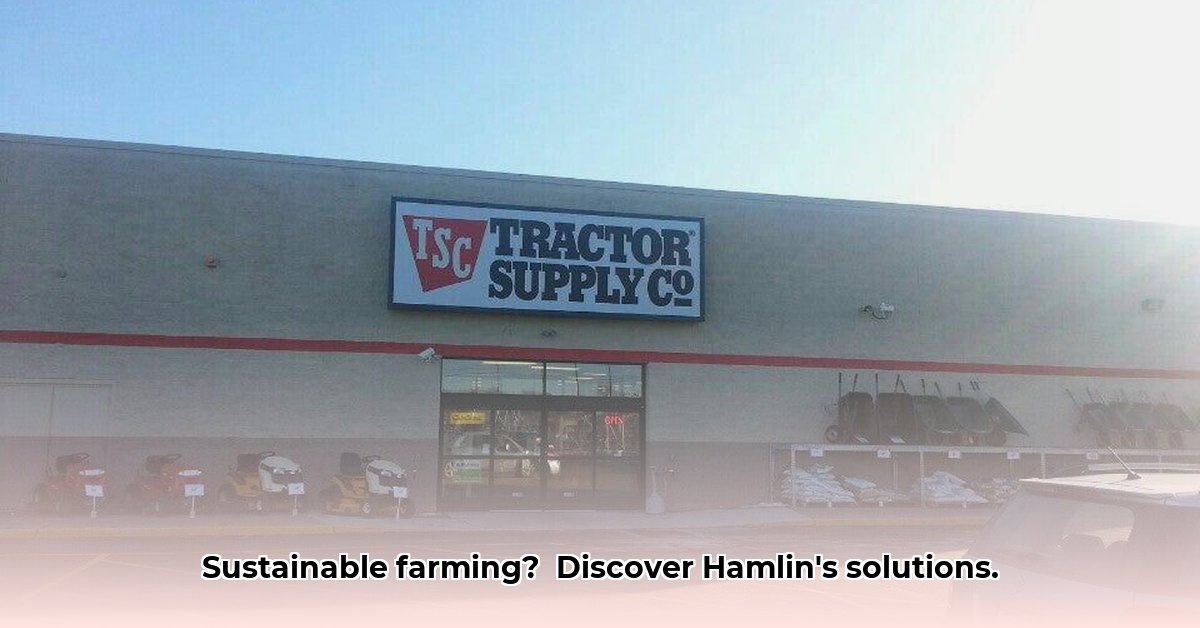
This article examines Hamlin Tractor Supply's potential role in supporting sustainable agriculture, using a similar Tractor Supply store in Lake Ariel, Pennsylvania, as a case study. While specific data for Hamlin is unavailable, analyzing the Lake Ariel store provides valuable insights into the opportunities and challenges Tractor Supply faces in promoting environmentally conscious farming practices. This analysis focuses on product offerings, stakeholder perspectives, and actionable recommendations. For ideas on raised bed gardening, check out this helpful resource: raised bed gardening.
Product Offerings and Sustainable Farming Practices
Tractor Supply stores, like the one in Lake Ariel, offer a wide range of products relevant to sustainable agriculture. These include seeds, soil amendments, animal feed, and gardening tools. However, the extent to which these products are sourced and produced sustainably remains unclear. A crucial next step is verifying the sustainability credentials of Tractor Supply's suppliers and evaluating their environmental impact across the entire supply chain. This includes scrutinizing packaging materials and manufacturing processes.
Stakeholder Perspectives and Collaboration Opportunities
Sustainable agriculture requires collaboration among various stakeholders. For Hamlin Tractor Supply to effectively support sustainable farming, it needs to engage with several key groups:
Tractor Supply Company: The company needs to conduct a thorough review of its product sourcing and packaging, aiming to prioritize organic and sustainably produced goods. A transparent supply chain traceability system would significantly strengthen their commitment to sustainability.
Local Farmers: Partnerships with local farmers are crucial. Hamlin Tractor Supply could feature locally sourced products in its store, providing a direct market for sustainable produce and promoting local agriculture. This collaboration could also extend to educational initiatives, such as workshops on sustainable farming techniques.
Customers: Educating consumers about the benefits of choosing sustainable products is essential. Hamlin Tractor Supply could achieve this through in-store signage, educational materials, and workshops demonstrating specific eco-friendly farming practices. Offering incentives for purchasing sustainable products would also stimulate demand.
Local Government/Organizations: Collaboration with local governments and organizations focused on sustainable agriculture could unlock access to grants and funding for sustainability improvements. This could involve joint initiatives promoting responsible land management and supporting local farmers' markets.
Assessing Risks and Mitigating Challenges
The transition to a more sustainable model presents certain challenges:
Supply Chain Disruptions: Sourcing sustainable products may involve navigating challenges in securing consistent supply. Mitigating this risk requires identifying multiple reliable suppliers and developing strong relationships with existing ones.
Fluctuating Customer Demand: Consumer preferences may shift based on factors like pricing and availability. Adaptability to changing market demands is essential, requiring flexible pricing strategies and clear communication about the advantages of sustainable choices.
Evolving Regulations: Keeping abreast of evolving environmental regulations is crucial to ensure compliance and avoid penalties. Proactive monitoring and engagement with policymakers are necessary.
Consumer Awareness: Many consumers may lack awareness of sustainable farming practices and the benefits of sustainable products. Addressing this requires targeted outreach and educational programs, possibly in partnership with local organizations.
Actionable Recommendations for Hamlin Tractor Supply
To enhance its role in supporting sustainable agriculture, Hamlin Tractor Supply should implement the following:
Conduct a comprehensive product sourcing audit, focusing on identifying and prioritizing suppliers committed to sustainable practices. This audit should measure the environmental impact of products across their lifecycle. (Efficacy metric: Reduction in carbon footprint by X% within Y years.)
Develop partnerships with local farmers and organizations, offering in-store promotions for locally sourced products and co-hosting workshops on sustainable farming techniques. (Efficacy metric: Increase in sales of locally sourced products by X% within Y years.)
Invest in clear and informative in-store signage and educational materials, educating customers about sustainable farming practices and the environmental benefits of choosing sustainable products. (Efficacy metric: Increased customer awareness of sustainable products demonstrated by surveys.)
Explore collaboration opportunities with local government and organizations, securing grants and funding to support sustainable agricultural initiatives. This might include supporting research, providing infrastructure improvements, and promoting educational programs. (Efficacy metric: Number of successful grant applications within Y years.)
By proactively addressing these areas, Hamlin Tractor Supply can strengthen its role in promoting sustainable agriculture within its community. Continuous monitoring and evaluation are essential to track progress and adapt to evolving needs. This approach ensures that Hamlin Tractor Supply not only provides essential farming supplies but also actively contributes to a more environmentally responsible future for agriculture.